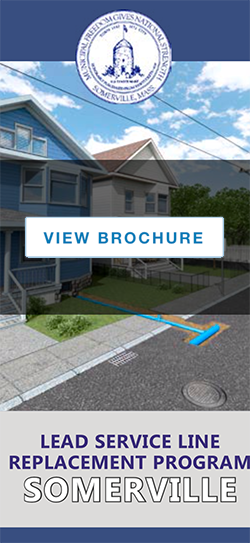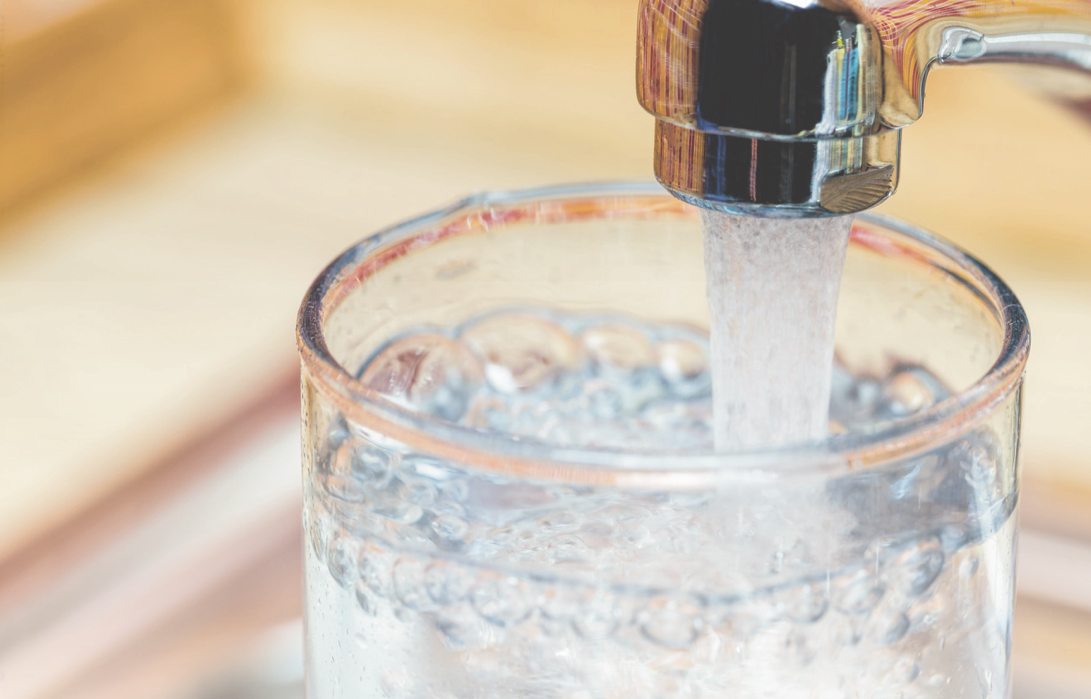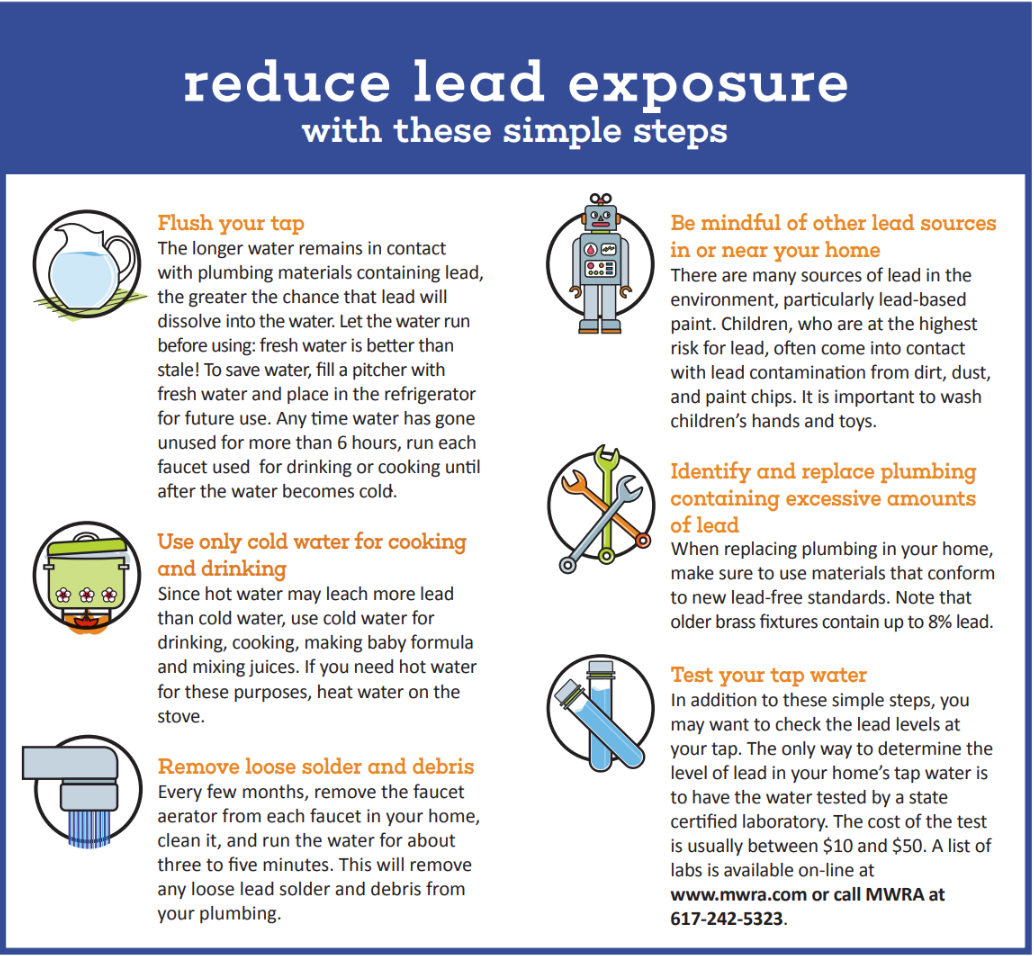Have your property’s lead or non-copper water service line replaced, free of charge.
 In 2019, The City of Somerville launched a Lead Service Line Replacement Program to improve our local water infrastructure and ensure all residents are receiving water that is free of lead.
In 2019, The City of Somerville launched a Lead Service Line Replacement Program to improve our local water infrastructure and ensure all residents are receiving water that is free of lead.
Water service lines are the pipes that connect individual properties to the water main in the street. According to available records in 2019, 3.6% of the City’s service lines, or 449 service lines, were known to be made of lead. Other services may be made of iron, galvanized steel, brass, plastic, or copper. Non-copper services can corrode, leak, or fail over time. This program seeks to eliminate any remaining traces of lead from our water system first, followed by other non-copper services.
Through the help of the Lead Loan Program offered by the Massachusetts Water Resources Authority (MWRA), the City of Somerville has received a portion of $100 million in state funding distributed to 45 eligible communities. This program provides residents with an opportunity to replace the entire length of their property’s lead or other non-copper water service line, at no charge to the property owner.
Questions? Please email LeadServices@somervillema.gov.

Contact Information
Jump To:
 Why should I participate in this program?
Why should I participate in this program?
Exposure to lead can cause serious health problems, particularly for infants, young children, and pregnant people.
To learn more about health risks related to exposure to lead in drinking water, visit these resources:
- EPA.gov: Basic Information About Lead in Drinking Water
- Mass.gov: Is There Lead in My Tap Water?
- CDC.gov: Lead Poisoning Protection
If your service line is made of made of brass, galvanized steel, iron, or plastic, you’re also eligible to participate in this program. Non-copper services can corrode, leak, or fail over time, so the City plans to replace those with copper piping after lead services have been removed.
How does lead get into drinking water?
Lead can leach into tap water if the service line that connects a home to the water main in the street is made of lead, or if there are plumbing fixtures in the home made of lead. The pipes that carry water in the street are usually made of cast iron or ductile iron and do not add lead to your water.
Homeowners and the City share ownership of the service line. The homeowner owns the section of the pipe that is under the homeowner's property. The City owns the section of the pipe between the property line and the water main.
Through the Lead Service Line Replacement Program, the entire service will be replaced, from the house to the water main in the street, at no cost to the homeowner.
How can I reduce my risk of potential exposure to lead through water?
If your water service line is made of lead, here are some steps you can take to protect yourself against lead exposure through your tap water:
- Run the faucet for at least 30 seconds before using water from the tap.
- Never use hot water from the faucet for drinking or cooking.
- If the material of your service line is unknown, have it inspected.
In 2021, the City completed Phase 1 of the Lead Service Line Replacement Program, investigating and replacing water services at 69 residences.
In 2022, the City completed Phase 2, investigating and replacing water services at 102 residences.
In 2023/2024, the City completed Phase 3, investigating services at 131 residences and replacing 76.
Phase 4 will begin in 2025.
Download the Service Line Inventory Spreadsheet and search for your address to find out if you're eligible for this program based on the criteria listed below. If you are, click on the Apply Now link.
OK, I’ve looked up my address. Now what?
- If your service is made of lead: Your service is a priority for replacement. Please click here to apply.
- If your service is unknown: You’re eligible to have the City’s contractor verify the material of your water service through this program. Please click here to apply.
- If your service is copper: You’re all set! No action is needed.
Through this program, non-copper services will be replaced with copper piping between the city water main (street) and the water meter (basement) at eligible properties.
How do I apply?
Please complete this online form. You can also pick up and submit a hard copy in person at the Engineering Division (Department of Public Works, 1 Franey Rd.). After you submit your application, someone in the Engineering Division will contact you to schedule your service replacement.
What does the service replacement actually entail?
Work to replace one water service is expected to take about one day to complete. The City’s contractor will remove and replace the existing non-copper water service from the water main in the street to the water meter inside your basement. Service-replacement work will be either trenchless or open excavation, depending on the location and condition of your piping. All disturbed surfaces will be restored to their original condition.

Questions? Call (617) 625-6600 x5400.
How does lead get into tap water?
Lead can seep into your tap water from corroding lead pipes and lead-lined plumbing fixtures, particularly if water sits in the pipes for a long time before use.
The City of Somerville purchases all of its water from the Massachusetts Water Resources Authority (MWRA). Water provided by the MWRA is lead-free when it leaves the reservoirs, and Somerville’s water mains in the street are made mostly of iron and steel, so they don’t add lead to the water supply.
How do I know if there’s lead in my tap water?
If you’ve identified one or more potential sources of lead in or around your residence, you can get your water tested by a state-certified lab. The test usually costs between $10 and $50. A list of labs is available on the MWRA website, or you can call the MWRA at 617-242-5323.
My residence has a water service line made of lead. Does that mean there’s lead in my tap water?
No, not necessarily. Lead can leach into the water from lead service lines if the lead pipes corrode. The MWRA uses effective corrosion-control treatment to make the water less corrosive, thereby reducing the likelihood that lead will leach into tap water from lead service lines. Measured lead levels in high-risk homes have decreased by 90% since corrosion control treatments began in 1996. However, replacing lead service lines is one of the most effective ways to minimize your risk of lead exposure through tap water.
My water service line is NOT made of lead; are there other ways lead could get into my drinking water?
Yes, lead can get into tap water if other plumbing fixtures in your residence are made of lead. If these lead-based materials corrode or wear away, they can add lead to tap water, particularly if water sits in the pipes for a long time before use.
What should I do to minimize my risk of lead exposure through tap water?
Besides having your lead service line replaced, if you have pipes or plumbing fixtures that do or could contain lead, you should take the following steps to minimize potential lead exposure until all sources of lead have been removed:
Can I use a water filter to eliminate my risk of lead exposure through tap water?
Some water filtration systems can remove lead, but you should verify the manufacturer’s claims by looking on the packaging or calling the manufacturer. You can also refer to the National Sanitation Foundation (NSF), an independent testing agency that evaluates and certifies the performance of filtering devices. They publish a list of NSF-certified filters for lead reduction in drinking water. Filters certified for lead removal are required to meet NSF Standard 53.
For a cheaper alternative that’s just as effective, run your tap until the water is noticeably colder before using.
I’m a renter. Can I participate in this program?
Yes! Renters are encouraged to submit an application if their building is eligible. A City staff member will then follow up with the property owner directly.
I can’t find my address in your search tool. What should I do?
You can scroll through the database manually, or you can contact a staff member in the Engineering Department at LeadServices@SomervilleMA.gov or (617) 625-6600 ext. 5400 to verify the material of your pipes.
Are there other programs offered by the City to help minimize my risk of lead exposure?
Yes. The Lead Paint Safe Somerville program is a separate initiative that helps create safe housing environments for Somerville families. Lead Paint Safe Somerville is a limited-time program that provides 0% interest forgivable loans to Somerville homeowners to address lead paint-based hazards. For more information, visit the program’s website, email LeadPaint@SomervilleMA.gov, or call (617) 625-6600 ext. 2584.
Feedback
Please submit website feedback using this form. Be sure to include:
Thank you for your feedback!
